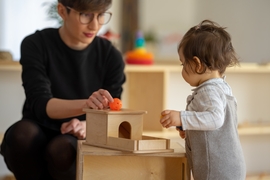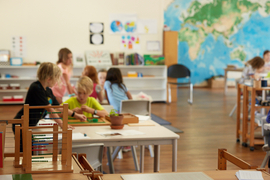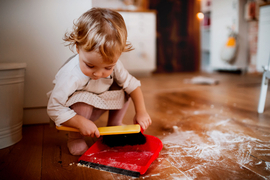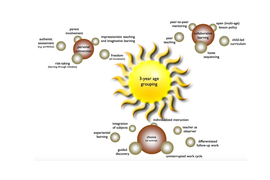
Parenting is one of the most rewarding and challenging roles we play as adults. Our society has high expectations of parents and yet we are not always able to access the resources we need to become the parent we want to be. Montessori can offer you a parenting framework from birth to maturity. It is more than an educational method; it is an approach to supporting the full development of your child.
Here are some simple, yet effective ways in which adults can support the development of a young baby.
Movement
- Allow your baby plenty of time for free movement. They will learn how to coordinate their movements and become stronger in their limbs if they have lots of practice time.
- A safe, comfortable mat on the floor can provide an ideal space for your baby to move. A large mirror placed length ways along the edge of the mat will provide your baby with an opportunity watch their whole body move. Mirrors promote social interaction. Your baby does not understand as yet that they are the baby in the mirror! A mat placed on the floor in front of a mirror is ideal for encouraging movement.
- Dress your baby in clothes that are soft and easy to move in.
- Ensure your baby is offered plenty of ”tummy-time” every day. Try lying down on the floor with your baby if they don’t seem comfortable to begin with.
- Avoid placing your baby in a position they can not get into by themselves. Their body needs considerable strength before they can support the weight of their head and upper body along the spine or through their legs.
Language
Your young baby is fascinated by the sound of and emotion in your voice as well as your facial expressions. They will enjoy listening to your voice which they are familiar with from pregnancy. You can talk to your baby about what you are doing during change times; or about your plans for the day; or the objects in your baby's environment. Your baby will watch your move intently as you speak.
- It is never too soon to begin to read to your baby. They will enjoy colourful picture books with one or two words on the page. Once they are able to grasp, they can hold a board or fabric book independently.
- Avoid playing music all the time or having the television on as constant background noise. It is difficult for babies’ brains to block this noise out in order to concentrate.
- When your baby watches your mouth as you speak, they will imitate the movements with their own mouth and may try to vocalise during the spaces your leave in the 'conversation'. Young babies are better able to practice these movements and sounds if their mouths are free. Limiting your baby's time spent with a dummy will assist with this.
- If you suspect an earache, take your baby to a doctor. Undiagnosed ear infections may lead to future hearing problems and delayed development of communication skills.
Social Emotional Development
Feeling safe and loved by you and others in their life, this feeds their healthy brain development.
- Handle their body gently during change times and make eye contact as often as possible
- Skin to skin contact and baby massage can promote feelings of ease and well-being in both you and your baby
- When you respond with attention to your baby's cues and cries, your baby receives the message that they can trust the world to meet their needs
Suggested Activities
- Hang mobiles around 20cm away from your baby, first to look at and then to reach for and grasp
- Offer your baby a range of everyday of objects from around the home to hold in her hand and to suck on. The items should be small and light – like a clean wooden bracelet or a small wooden spoon, a clean hairbrush or a wash cloth. Give her items which feel different including objects made from metal, plastic, wood and fabric.
- Your baby only needs one or two objects to explore at a time.
- Observing what your baby does with the objects you offer her will give you information about what interests her and how to follow her development.
- Respond to your baby's attempts to communicate. Smile when she smiles and make noises in response to her noises.
- Avoid television or screen-based activities. Research shows that “screen-time” may be detrimental to infants under 2 years of age.
Did you know?
Newborn babies can only see in black and white when they are born. All other colours look grey. Young babies respond well to black and white pictures, mobiles and books. From 2 months you can add the colours of red and green, then blue and yellow at 3 months. By the 4 months, your baby will be able to see a full range of colours



